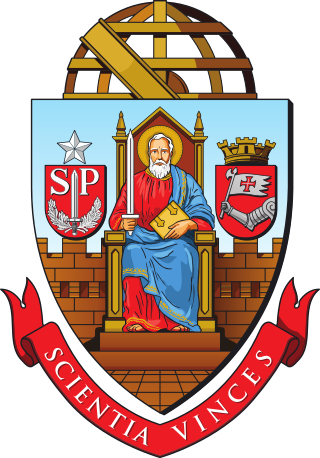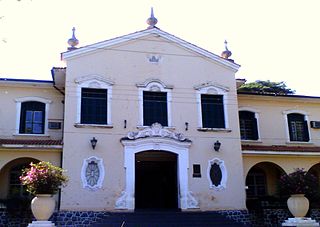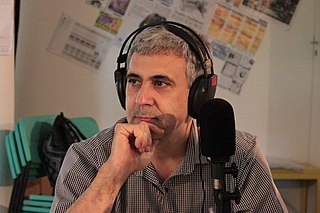Related Research Articles

Ribeirão Preto is a municipality and a metropolitan area located in the northeastern region of São Paulo state, Brazil.

The University of São Paulo is a public university in the Brazilian state of São Paulo. It is the largest Brazilian public university and one of the country's most prestigious educational institutions. USP is involved in teaching, research and university extension in all areas of knowledge, offering a broad range of courses.
Miguel Rolando Covian, was an Argentine-Brazilian physiologist, medical educator and writer.
Maurício Oscar da Rocha e Silva was a Brazilian physician, biomedical scientist and pharmacologist. He discovered bradykinin, an endogenous polypeptide involved in the physiology, pharmacology and pathology of blood pressure control and many other phenomena related to the contraction of smooth muscles.

Faculdade de Medicina de Ribeirão Preto is a medical school of the University of São Paulo (USP) located in the city of Ribeirão Preto, state of São Paulo, Brazil, founded in 1952. It is considered one of the three best medical schools in the country and a premier medical research center.
Eduardo Moacyr Krieger is a Brazilian physician, physiologist and scientific leader, current president of the Brazilian Academy of Sciences.
Warwick Estevam Kerr was a Brazilian agricultural engineer, geneticist, entomologist, professor and scientific leader, notable for his discoveries in the genetics and sex determination of bees. The Africanized bee in the western hemisphere is directly descended from 26 Tanzanian queen bees accidentally released by a replacement bee-keeper in 1957 in Rio Claro, São Paulo in the southeast of Brazil from hives operated by Kerr, who had interbred honey bees from Europe and southern Africa.
Fritz Köberle was an Austrian-Brazilian physician, pathologist and scientist, discoverer of the neurogenic mechanism of the chronic phase of Chagas disease, a human parasitic disease caused by Trypanosoma cruzi, a protozoan.

Cesare Mansueto Giulio Lattes, also known as César Lattes, was a Brazilian experimental physicist, one of the discoverers of the pion, a composite subatomic particle made of a quark and an antiquark.
Zeferino Vaz was a Brazilian doctor who led the construction, establishment and development of the Unicamp university, in the interior of the State of São Paulo, Brazil in the 1960s and 1970s. The main campus is named after Zeferino, who strived to bring together some of Brazil's best scientists to form a recognised research institution.

Henrique da Rocha Lima was a Brazilian physician, pathologist and infectologist born in Rio de Janeiro. With his friend, Stanislaus von Prowazek, he described what would later be known as Rickettsia prowazekii, the pathogen of epidemic typhus. Rocha Lima named the organism after Prowazek and American bacteriologist Howard Taylor Ricketts (1871-1910).
Lucien Alphonse Joseph Lison (1908–1984) was a Belgian/Brazilian physician and biomedical scientist, considered the "father of histochemistry".

The Faculdade de Filosofia, Ciências e Letras de Ribeirão Preto, is a liberal arts college of the University of São Paulo campus at Ribeirão Preto, São Paulo, Brazil. It was created in 1959, and incorporated into the University in 1974.
Renato Helios Migliorini was a Brazilian physician, biomedical scientist, biochemist and full professor of physiology at the Medical School of Ribeirão Preto of the University of São Paulo.

Maurício Waldman is a Brazilian academic and environmental activist.

Marco Antonio Zago is a Brazilian physician and prominent medical scientist, who is active in the fields of hereditary diseases of the blood, molecular basis of cancer and human population genetics. Aside from working directly as scientes, he has been president of the Brazilian National Research Council (CNPq) and dean of the University of São Paulo. He's now the president of the São Paulo Research Foundation (Fapesp).
José Moura Gonçalves, Brazilian physician, biomedical scientist, biochemist and educator, one of the pioneers of biochemistry in the country.

Sílvio Ferraz is a Brazilian contemporary composer.
Euripedes Constantino Miguel Filho is a Brazilian psychiatrist. He is a graduate of the Faculdade de Medicina da Universidade de São Paulo. He currently holds the title of Full Professor and is the Vice-Head of the FMUSP Department of Psychiatry. He is also an Adjunct Associate Professor at Duke University and at Yale University, as well as being a Research Consultant for Harvard University School of Medicine Massachusetts General Hospital. Miguel has authored or co-authored more than 150 articles published in journals indexed for the major international databases. Since 2004, he has coordinated the Consórcio Brasileiro de Pesquisa dos Transtornos do Espectro Obsessivo-Compulsivo. He is a researcher for the Fundação de Amparo à Pesquisa do Estado de São Paulo and is the recipient of a 1B Research Productivity Grant from the Brazilian Conselho Nacional de Desenvolvimento Científico e Tecnológico. He is also the Director of the multicenter Instituto Nacional de Psiquiatria do Desenvolvimento para Infância e Adolescência, which was established under the auspices of the Institutos Nacionais de Ciência e Tecnologia. In the area of obsessive-compulsive disorder (OCD), he is coordinating his third FAPESP-sponsored Program Grant, which is focused on the investigation of neural circuits and biomarkers involved in OCD through the study of behavioral paradigms of fear and anxiety.
References
- ↑ ":: Agência FAPESP - Divulgando a cultura científica ::". Archived from the original on 2003-10-24. Retrieved 2006-01-29.
- ↑ "[ISI Highly Cited Researchers Version 1.5]".
- ↑ "Currículo do Sistema de Currículos Lattes (Gilberto De Nucci)".
- ↑ "Galenos Research - Clinical Research in Dallas, TX". www.galenoresearch.com.